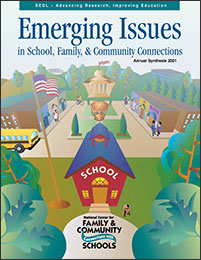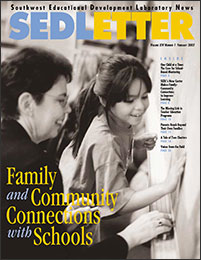SEDL's New Center Makes Family-Community Connections to Improve Learning
 | |
| Staff members of SEDL's National Center for Family and Community Connections with Schools are (left to right) Lacy Wood, Amy Averett, Catherine Jordan, Artie Stockton, Dana Center partner Maggie Myers, Deborah Donnelly, and Vangie Orozco. Not pictured: Dana Center partner Marilyn Fowler. | |
Thirty-five years of research show that school, family, and community interaction can make a difference in a student's learning experience. "Studies suggest that family involvement can improve student attendance, behavior, and academic achievement, while community involvement can help provide services that schools alone cannot give students and their families," says Catherine Jordan, director of SEDL's National Center for Family and Community Connections with Schools.
Based on this research, schools nationwide are tapping into their communities for support. But many schools and districts are unsure which programs or strategies for family and community involvement would most effectively improve student outcomes, given their student population and school and community context.
Jordan says, "When schools, families, and communities work together to address student achievement, their efforts may have a more significant impact on low-performing schools. To do this, schools, policymakers, and community groups must be knowledgeable about strategies and tools for family and community involvement, and be able to assess which of these would be most successful locally."
Established in 2000 under SEDL's Regional Educational Laboratory contract through the U.S. Department of Education, the national center is developing strategies to support people and organizations working to connect schools with families and communities across the country. The center emphasizes partnerships that have a direct impact on student achievement in reading and mathematics, as well as contribute to overall student success. It also focuses on connecting families from diverse communities with schools and involving families in preparing children to enter kindergarten.
Center staff members are building a network of local, state, regional, and national organizations—including policymakers, educators, parents, and community members—to share information and raise public awareness about the school-family-community connection. National partners joining the center's network to disseminate the latest research, programs, policies, and practices from the country's 10 regional educational laboratories (RELs) include the Johns Hopkins Center on School, Family, and Community Partnerships; the National Center for Early Development and Learning at the University of North Carolina at Chapel Hill; the Public Education Network; and the Charles A. Dana Center at the University of Texas at Austin.
"Outside the REL network, there is no organization that is collecting and synthesizing the research and resources related to family and community connections with schools in a comprehensive way," says SEDL program specialist Amy Averett. "Our job is to pull together these types of information, synthesize them, and disseminate the synthesis so that practitioners can access and use research-based information to support their practice."

This year's research synthesis, the first in a series of five, covers four key issues: clarification of the concept of family and community connections with schools, measuring the outcomes of family and community connections, advancing the research base for family and community connections with schools, and addressing critical areas for research in family and community connections with schools. The annotated bibliography of current research is now online and the synthesis may soon be found online at http://www.sedl.org/connections/.
In addition to the annual synthesis, the staff of the national center is presenting videoconference or satellite broadcasts every quarter and an annual conference. The most recent satellite broadcast was "Educator Preparation for Connecting Families and Communities with Schools," while the Center's annual conference held on November 16 focused on "Family and Community Connections with Schools—Emerging Issues." Video clips from the broadcast and conference will also be available online this spring.

Next Article: The Missing Link in Teacher Education Programs

